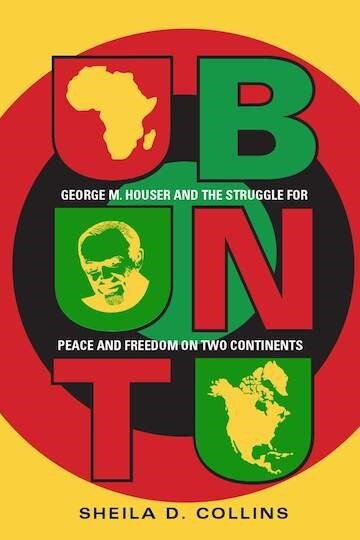Ubuntu: George M. Houser and the Struggle for Peace and Freedom on Two Continents
George M. Houser, a white American United Methodist minister, was one of the pivotal founders and organizers of movements for peace and racial justice in the 20th century. His tireless and principled activism spanned almost half a century and two continents. As one of the principal interpreters of Ghandism on the American Left, he pioneered as early as the 1940s the repertoire of strategies and tactics that would be taken up later by the modern Civil Rights Movement. Moving on from civil rights he turned toward transnational activism, playing a critical role in support of the anti-colonial movements throughout Africa and, again, pioneering strategies and tactics that, over time, would help, along with the efforts of a vast international network, to bring down the South African apartheid regime.
Sheila Collins’s well-researched biography, Ubuntu: George M. Houser and the Struggle for Peace and Freedom on Two Continents, recounts the events that informed Houser’s life of activism—from his childhood experiences as the son of missionaries in the Philippines to his early grounding in the Social Gospel and the teachings of Mahatma Gandhi. In light of the corruption the U.S. and the world face today, Houser’s story of faith and decisive action for human rights and social justice is one for our time.
Sheila D. Collins is Professor of Political Science Emerita, William Paterson University and former director of its graduate program in Public Policy and International Affairs. She is the author or co-author of seven books and numerous articles, book chapters and encyclopedia entries on American politics and public policy, social movements, and religion. Her books include: Ubuntu: George M. Houser and the Struggle for Peace and Freedom on Two Continents (forthcoming, Ohio University Press, 2020); When Government Helped: Learning from the Successes and Failures of the New Deal (co-authored and edited, 2014); Washington's New Poor Law: Welfare Reform and the Roads Not Taken, 1935 to the Present (co-authored, 2001); Let Them Eat Ketchup! The Politics of Poverty and Inequality (1996); Jobs for All: A Plan for the Revitalization of America (co-authored, 1994); The Rainbow Challenge: The Jackson Campaign and the Future of U.S. Politics (1987); and A Different Heaven & Earth: A Feminist Perspective on Religion (1974). Her blogs have appeared on Truthout, Huffington Post, Oxford University Press, New Politics and Religion Dispatches. Her most recent research and writing focuses on climate change and environmental crisis. She has lectured on these subjects both nationally and internationally.
Before going into academia, Collins worked for national church agencies and as coordinator of a policy network of activist academics on issues of full employment and adequate income. In 1984 she served as National Rainbow Coordinator of the Jesse Jackson for President primary campaign and wrote the definitive book on that campaign. Collins co-Chairs the Columbia University Seminar on Full Employment, Social Welfare and Equity; is a co-founder and board member of the National Jobs for All Network, and is a member of the Global Ecological Integrity Group, an international network of scholars and activists working on issues related to climate change. In 1999 she was the recipient of the MFSA Dale and Gwen White Award along with her husband, former MFSA president, Rev. John Collins and was the recipient of the Albert Nelson Marquis Lifetime Achievement Award in 2019 The couple of have two daughters—Jennifer, a professor of Political Science and Megan, a physician, as well as five grandchildren.

